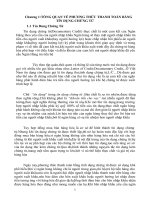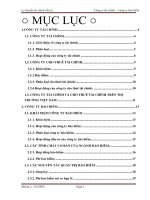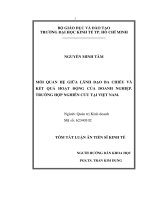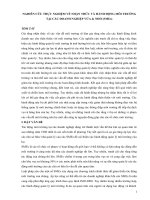Phân tích nguyên lý lãnh đạo và hiệu suất trong hoạt độngVí dụ về greenwash tại các công ty FMCG
Bạn đang xem bản rút gọn của tài liệu. Xem và tải ngay bản đầy đủ của tài liệu tại đây (118.39 KB, 10 trang )
ASSESSMENT 3
INDIVIDUAL MANAGEMENT CASE RESEARCH
Subject Coordinator: Malliga
Marimuthu
Lecturer: Tariq Halimi
[Author name]
2019-BUS5SMM(BU-2/CB-2)
Table of Contents
2
1. Introduction
Leadership is the primary area in management due to its tremendous role in driving the
organization’s success. The interest in leadership has risen in economy and psychology
studies for decades; consequently, many leadership theories have introduced the Great Man
Theories, Trait Theories, Behavioral Theories, etc. Besides, gender in leadership also affected
the development when female leaders now recognize as successful as their counterparts in
the workplace through leadership styles and efficiencies (Kuchynková 2015, p.166). Indra
Nooyi – the Former Chairman and CEO of PepsiCo, is an example of that as she was ranked
as the eleventh powerful woman by Forbes 2017 (Forbes) before stepping down in 2018.
‘Performance with Purpose’ program, which reshapes one of the best well-known beverage
companies into a sustainable business, is the most significant Nooyi contribution in PepsiCo’s
role.
Sustainability has developed rapidly across the economy as Fast-Moving Consumer Goods
(FMCG) companies have promised to support ecosystem problems and social issues while
increasing business growth. However, these firms have taken advantage of the sustainable
spot as some of them accused of greenwashing, such as Nestlé, Cadbury, and Fiji Water. This
report will discuss the leadership theories in Performance with Purpose and display the
three FMCG firms' greenwash strategy and their impacts on society while giving
management recommendations for future actions.
2. Leadership theories and ‘Performance with Purpose.’
2.1. Leadership theories
Leadership is naturally the art of motivating, organizing, and inspiring followers towards
achieving desired goals (Samson and Daft 2015, p.605). According to Samson and Daft (2015,
p.612-613), leader traits include intelligence, honesty, self-esteem, and sometimes
appearance. Optimism is another critical characteristic of a leader because it shows the
leader’s ability to see the positive side when others see the negative one. However, it is
crucial to ensure the leader is doing the right things and evaluates it by real-world tests
(Samson and Daft 2015, p.613).
3
2.2. Performance with Purpose
‘Performance with Purpose’ is a sustainable program designed and launched by Indra Nooyi
- the former Chairman and CEO of PepsiCo. The program is applying a sustainable mindset in
the triple-bottom-line concept (Product, People, and Planet). Firstly, PepsiCo aims to
enhance its products to become healthier for consumers (PepsiCo 2019). Secondly, the
employee's working environment engrosses the value chain; it also empowers women to
increase their voices and role in economic growth (PepsiCo 2018). Lastly, increasing water
consumption efficiency in farms, distributing safe water for the water-stressed regions, and
using renewable and recycled materials in the packaging in 2025 are PepsiCo commitments
to the ecosystem (PepsiCo 2018).
Furthermore, this program is a confirmation of Nooyi's leadership as an authentic and
transformational leader. An authentic leader is a transparent and principled leader who
inspires diverse viewpoints while welcoming followers’ participation (Avolio, Walumbwa &
Weber 2009, p.243). Nooyi pursues her purpose in an authentic leader's key characteristics
by putting the mission and executing for the long-term goal (Kruse 2013). Under her
management, PepsiCo not only keeps an eye on the growth but also takes social
responsibilities. For instance, the program was created to deliver outstanding financial
returns while practicing the triple-bottom-line philosophy (Women in the World 2019) with
new goals that renew every fiscal year to reach the 2025 agenda. Additionally, Nooyi also led
both by heart and mind. She paid attention to making a life for employees when working at
PepsiCo and supported women’s rights and performance in the economy through training
activities (PepsiCo 2018).
From the transformational leadership perspective, reorganizing the company is the critical
point of Nooyi's leadership style. If the company had not reset, it would not sustain
performance, and all commitments are nothing but a greenwash strategy. Due to her
decision, PepsiCo turns into a greener business. The shareholders and employees are
inspired to take responsibility for the program's environment and society (Fortune Magazine
2011, Women in the World 2019). As a result, the ‘Performance with Purpose’ became a
part of PepsiCo’s DNA (Schawbel 2017).
4
3. Greenwash strategy in FMCG companies’ commitments and the social impacts
3.1. Greenwash strategy
Greenwash refers to dishonest marketing means (Whitman 2018) used by companies or
organizations to mislead customers about the eco-friendliness of products and the
harmlessness to the business environment. However, the reality is tremendously reversed
(Kenton 2019). Additionally, the untruthfulness of the application of sustainable
commitments seems to be a collapse in leadership.
3.2. Nestlé greenwash strategy and the social impacts
In the commitment to sustain the environment, Nestlé confidently claimed to improve
packaging performance by replacing the non-renewable materials with alternatives,
supporting recycling activities, and ending up landfill or litter to reduce the usage of single
plastic and plastic pollution in the globe.
Nonetheless, the plastic packaging announcement was defined as “more of the greenwash
baby steps” by Greenpeace Oceans Campaigner Graham Forbes (Greenpeace 2018).
According to Greenpeace, Nestlé's single-plastic waste accounted for the highest figures in
the beach cleaning activity on Freedom Island, Philippines 2017, among other companies
like Unilever and P&G; therefore, the company must take responsibility for this disaster
(Greenpeace 2017). However, the company tried to prove their commitments by the
declaration from the third party, Bureau Veritas UK Limited (Nestlé). Nestle's problem is that
the company was so aggressive about its sustainable goals, but targets are non-exist and
defined; moreover, they transferred the responsibility to wash up the plastic litter on clients,
not themselves (Wheeler 2018).
3.3. Mondelez greenwash strategy and the social impacts
Mondelez - the Cadbury chocolate brand's parent company, was sued for the responsibility
to clear up the tropical forest in Southeast Asia to make room for green palm oil farms that
put orangutans endangered. The Independent reported Greenpeace International's analysis
that the company has destroyed 70,000 hectares of rain forest in Indonesia since 2016,
including 35 percent of orangutan habitation (Dalton 2018). The report also mentioned that
Mondelez claimed to purchase and entirely control the palm oil from 2013 even though it is
an invalid certificate granted by the Roundtable on Sustainable Palm Oil (RSPO).
5
After the alarms from conversation organizations, Mondelez has explained its commitment
to eliminating deforestation in its supplier. They would engage the third party to prove the
palm oil supply (Dalton 2018). However, the company's chocolate products – Cadbury brand
still ban on shelves of Auckland Zoo and Melbourne Zoo due to the uncertainty on palm oil
origin and sustainable palm oil commitment (Razak 2019).
3.4. Fiji Water greenwash strategy and the social impacts
Fiji was established in 1996 with an ambition to deliver premium water to customers around
the world (Fiji Water). The company publishes a plan to be a sustainable business on the
website and its commitment to making 100 percent plastic bottles from rPET - a recycled
plastic material. To support the plan, Fiji founded a philanthropic fund. It also joined
Conservation International to make positive influences on Fiji communities, such as transfer
access to clean and safe water to rural areas, construct facilities that are beneficial for young
generations educating and adults, provide healthcare services for people in underprivileged
areas, and conserve the largest residual rain forest of Fiji island (Fiji Water).
Nevertheless, the WHO analysis on water access in 2017 cited by Guardian displayed that
only 47 percent of Fijians get access to clean water at this time, and only 74 percent of them
experienced sanitation (Guardian). Thus, Fiji's marketing campaign had entirely misled
customers when it proudly stated that “Every drop is green.” Further, the company was in a
lawsuit case in 2011 because of its carbon-negative marketing. The fact is that customers
pay more for Fiji products because they believe they are paying for the environment and
supporting the cutting carbon emission as the company advertised. However, the
manufacturing process and shipping the bottled water from coast-to-coast countries to Fiji
countries is an outrageous example of greenwashing (Quraishi 2011).
4. Management recommendations
There are some recommendations that these companies can follow to make management
decision:
•
The business owner might probably change the way to position their products
because no specific sustainable standard of eco-friendliness is currently available.
They can adjust the fantastic sustainable goal to be more reliable and measurable.
6
For instance, state the business or products to be more sustainable or greener
instead of 100 percent sustainable.
•
If the company wants to keep the green positioning, business leaders would put all
commitments and plans into action and stop claiming fantastic outcomes but do
nothing.
•
The company leader must be honest and transparent to their sustainable statements
by supporting analysis and information. For example, updating the sustainable report
annually with each factor's figures and comparing that achievement with the final
goal. If the company cannot achieve the set goal, confession is better than a white
lie.
•
A third party may be a useful assistant to audit and verify the product and its
sustainability. However, the party should be neutral, which means it does not receive
any sponsors from its shareholders.
7
REFERENCING
Avolio, BJ, Walumbwa, FO & Weber, TJ 2009, ‘Leadership: Current Theories, Research
and Future Directions’, Annual Review of Psychology, vol.60, pp.421-449.
Dalton, J 2018, ‘Chocolate giant Cadbury ‘still pushing orangutans towards extinction
by wrecking habitat for balm oil’, INDEPENDENT UK, 13 November, viewed 23 October 2019,
< />Fiji Water, About Us, Fiji Water, viewed 24 October 2019,
< />Forbes, #11 Indra Nooyi, Forbes, viewed 23 October 2019,
< />Fortune Magazine 2011, Indra Nooyi: Performance with purpose, online video, 10
November, Fortune Magazine, viewed 23 October 2019, < />v=BDTVdX-enr4>.
Górska, A 2016, ‘Gender Differences in Leadership’, Studia i Materiały Wydziału
Zarządzania UW, vol.20, pp.136-144,
< />>.
Greenpeace 2017, Nestlé, Unilever, P&G Among Worst Offenders for Plastic Pollution
in Philippines Beach Audit, EcoWatch, viewed 23 October 2019,
< />Kenton, W 2019, Greenwashing, Investopedia, viewed 23 October 2019,
< />Kruse, K 2013, ‘What Is Authentic Leadership?’, Forbes, 12 May, viewed 23 October
2019, < />
8
Kuchynková, L 2015, ‘Differences Between Women’s and Men’s Leadership Style’,
Conference: International Conference on Management, Leadership and Governance (ICMLG
2015), New Zealand, viewed 23 October 2019,
< />d_Men’s_Leadership_Style>.
Nestlé, Improving packaging performance, Nestlé, viewed 23 October 2019,
< />Nestlé, Independent Assurance, Nestlé, viewed 24 October 2019,
< />PepsiCo 2018, OUR GOALS, PepsiCo, viewed 10 October 2019,
< />PepsiCo 2018, PEPSICO’S PERFORMANCE WITH PURPOSE GOALS: People, PepsiCo,
viewed 10 October 2019, < />PepsiCo 2018, PEPSICO’S PERFORMANCE WITH PURPOSE GOALS: Planet, PepsiCo,
viewed 10 October 2019, < />PepsiCo 2019, PEPSICO’S PERFORMANCE WITH PURPOSE GOALS: PRODUCTS,
PepsiCo, viewed 10 October 2019, < />Quraishi, J 2011, Fiji Water Sued of Greenwashing, Mother Jones, 7 January, viewed
24 October 2019, < />Razak, I 2019, ‘Cadbury, Natural Confectionery products dropped by Melbourne Zoo
over palm oil, ABC News, 26 February, viewed 23 October 2019,
< />
9
Samson, D & Daft, RL 2015, Management 5th Asia-Pacific Edition, CENGAGE Learning,
Mealbourne.
Schawbel, D 2017, ‘Indra Nooyi: Achieving Both Financial Growth and Purpose at
PepsiCo’, Forbes, 21 November, viewed 23 October 2019,
< />The Guardian, Access to clean water, The Guardian, viewed 24 October 2019,
< />Wheeler, P 2018, Nestlé misses the mark with statement on tackling its single-use
plastics problem, Greenpeace, viewed 23 October 2019,
< />Whitman, M 2018, Greenwashing as a marketing tool, Sydney Environment Institute,
viewed 23 October 2019, < />Women in the World 2019, Indra Nooyi: Truths from the Top, online video, 12 April,
Women in the World, viewed 23 October 2019, < />v=AS_THnmaQ7I>.
10









